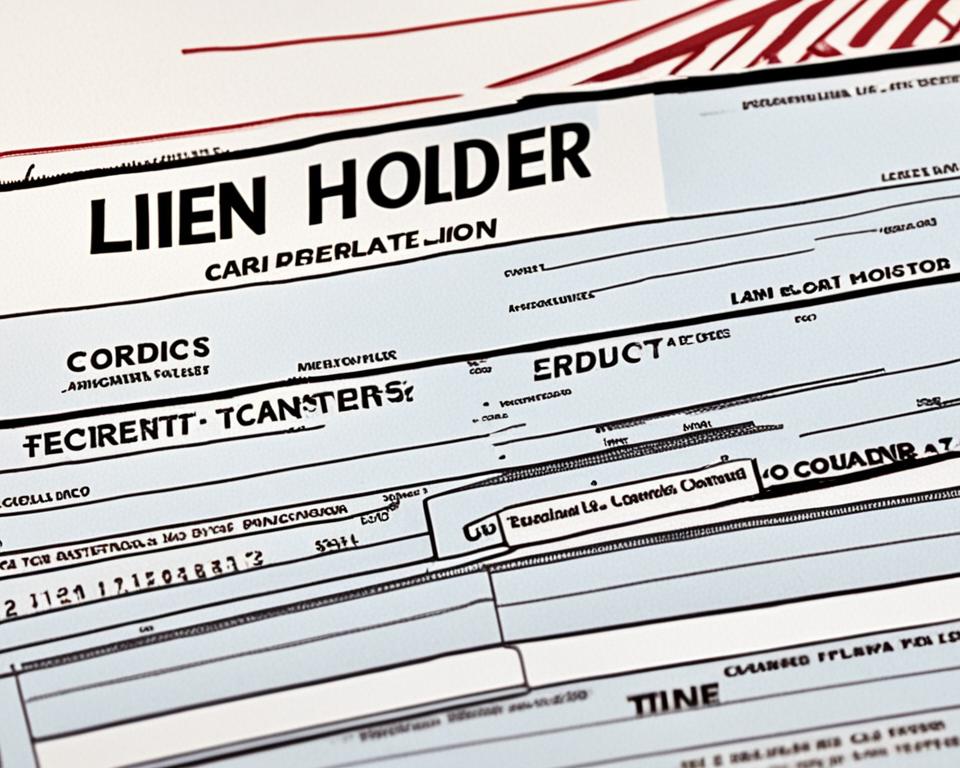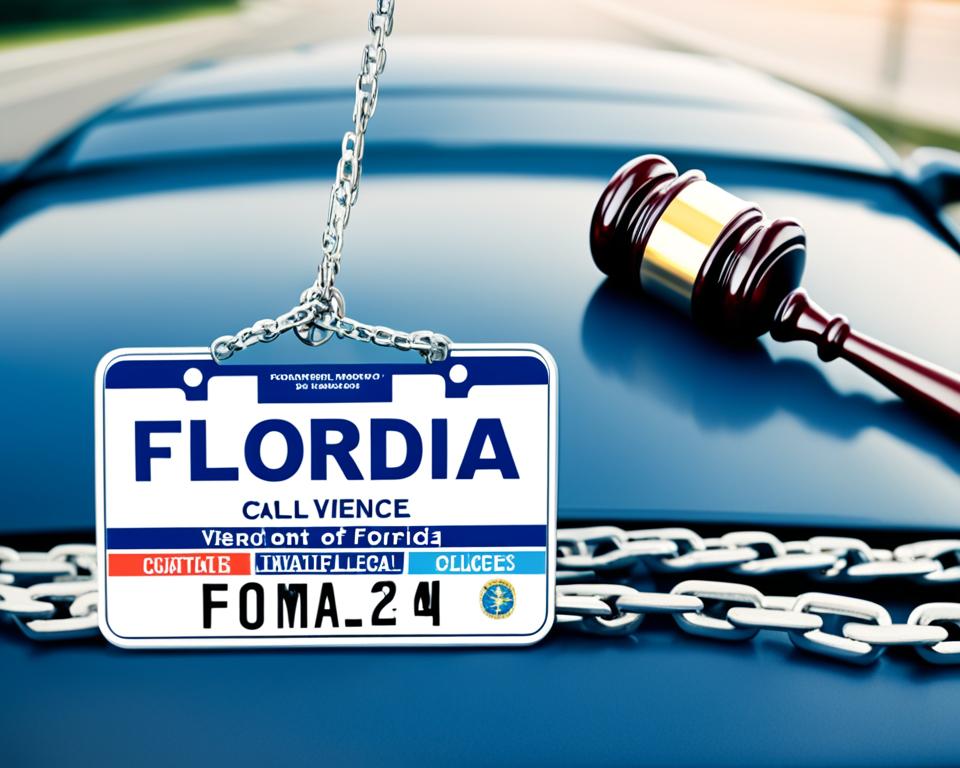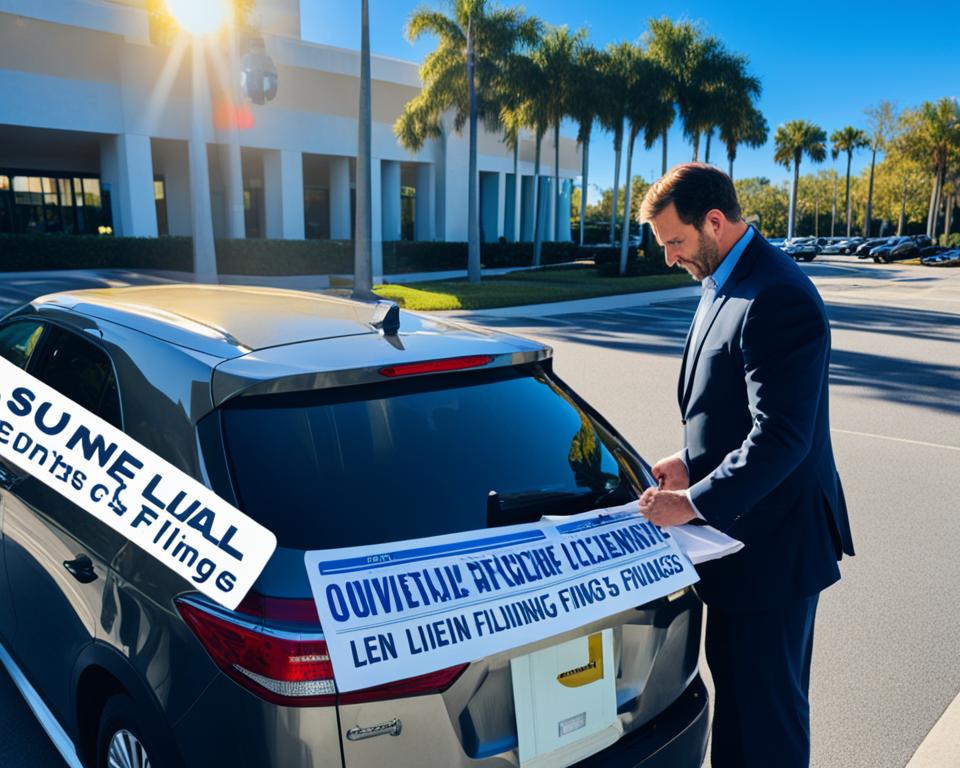Ever wondered how lenders secure their interests when financing a vehicle purchase? Placing a lien on a vehicle in Florida is the answer. But how exactly does one navigate the intricate steps of the Florida vehicle lien process, ensuring all legal requirements are met?
When filing a vehicle lien in Florida, understanding the state’s specific requirements is crucial. The Florida Department of Highway Safety and Motor Vehicles (FLHSMV) provides the forms needed to register liens on motor vehicles, vessels, and mobile homes. One of the initial steps involves registering for the Electronic Lien and Title (ELT) service by submitting FLHSMV Form 82150 to get an ELT DMV ID Number. This identifier is key for managing electronic liens.
For a title application, DMV Form 82040 is required. Non-dealer lienholders must use Form 82139 to notify and place the lien, including their information and DMV ID Number. The process is streamlined by electronic efficiency, ensuring lienholder rights in Florida are securely upheld and managing Florida electronic liens can begin within days of submission.
By adhering to these steps, lienholders can make sure their claims are recognized and enforceable, protecting their financial interests in the state’s bustling automotive market.
Understanding Vehicle Liens
When it comes to vehicle ownership in Florida, understanding the lien process is essential. Establishing a lien on a car in Florida involves legal and procedural steps to protect creditors. Whether you’re a finance company, a bank, or an individual, knowing how these steps work helps in efficiently securing your interests.

What is a Vehicle Lien?
A vehicle lien is a legal claim placed by a creditor over a debtor’s car. This claim ensures that the debt will be cleared before the owner can sell or transfer the vehicle’s title. When you’re establishing a lien on a car in Florida, you’re claiming the right to hold onto the vehicle until the debt is fully paid. This is often rooted in legal judgments or unpaid financial obligations.
Why Place a Lien on a Vehicle?
Placing a lien on a vehicle in Florida offers creditors security. If debts from loans, unpaid rent, or other financial obligations are not repaid, creditors like banks, credit unions, or individuals can ensure they recover their investments. The Florida car lien process guarantees that they have a legal avenue to reclaim these funds, typically by repossessing the vehicle if necessary.
Types of Vehicle Liens
Vehicle liens in Florida fall into two main categories: voluntary and involuntary. Voluntary liens are those agreed upon at the time of purchase, usually involving a financial institution. Involuntary liens, however, arise from unpaid debts such as child support, fines, or court judgments. Both types are essential facets of the Florida car lien process, offering various entities the protection of their investments.
The vehicle lienholder rights in Florida allow creditors to access public records to verify lien statuses. The process is supported by the Florida Department of Highway Safety and Motor Vehicles (DHSMV) to ensure transparency and legal compliance. By understanding these types and the necessary procedures, stakeholders can navigate the Florida car lien process more effectively.
Florida Vehicle Lien Laws
Understanding Florida vehicle lien laws is essential for anyone looking to safeguard their interests as a lienholder. These laws stipulate specific actions to ensure that liens are properly enforced and recognized.
Important Legal Requirements
In Florida, vehicle lien requirements are quite explicit. A lienor must provide a notice within 15 business days from the commencement of storage charges. This ensures fairness and transparency, especially when dealing with vehicle repair liens. Additionally, no vehicle can be sold until at least 60 days have passed following the completion of any repair work, safeguarding the rights of the vehicle owner.
An interesting statistic is that lienors are only allowed to charge for up to 15 days of storage if the notice is late. Furthermore, any claim to proceeds from a vehicle sale has a strict time frame: it must be validated within a year and a day from the sale date. These rules underscore how detailed Florida vehicle lien laws are in protecting both lienholders and vehicle owners.

Electronic Lien and Title (ELT) System
Florida’s ELT system revolutionizes how we manage vehicle liens. With the mandate that all liens must be noted electronically on the Florida certificates of title, the system enhances security by minimizing the risk of document loss or theft. The use of electronic titles, or e-titles, ensures that titles with active liens are clearly distinguished.
For vehicles with active electronic liens, the satisfaction process must also be handled electronically. This transition to digital helps streamline the entire process, serving as a constructive notice to creditors and potential purchasers. The efficiency brought by the ELT system in adhering to the Florida vehicle lien requirements also aids in quick and reliable lien management.
Florida Vehicle Lien Requirements
When you’re looking to put a lien on a vehicle in Florida, it’s vital to know the specific requirements and steps involved. The process involves several important documents and eligibility criteria that need to be met. Let’s dive into these to ensure everything goes smoothly.
Documents Needed
To kick off the Florida car lien process, you’ll need to be ready with all the necessary documents. This includes your ELT DMV ID Number, which is essential to the process. Here are the key forms you’ll need:
- FLHSMV Form 82150: This is for registering for the Electronic Lien and Title (ELT) service.
- FLHSMV Form 82040: Used for title application, mainly by dealers.
- FLHSMV Form 82139: Essential for non-dealer lienholders to notify and place the lien.
Make sure all these forms are filled out accurately with details such as the Vehicle Identification Number (VIN) and your lienholder information. Any inaccuracies can delay the steps to put a lien on a car in Florida.
Eligibility Criteria
Not everyone can place a lien on a vehicle; certain eligibility requirements must be met. Primarily, you need to be a lender or a creditor with a vested interest in the vehicle. This means that if someone owes you money for the vehicle, you have the right to place a lien.
Additionally, according to Chapter 559 of the Florida Statutes, motor vehicle repair shops can claim liens on vehicles after performing repairs. It’s essential to follow the legal guidelines to avoid complications. For example, failure to comply with the certificate of release issued by the court could result in civil and criminal penalties.
Understanding these Florida vehicle lien requirements ensures that you’re legally protected and that the process moves forward without unnecessary hiccups. Following these steps to put a lien on a car in Florida will help safeguard your financial interests and streamline the Florida car lien process.
Steps to Put a Lien on a Car in Florida
If you’re looking to file a vehicle lien in Florida, it helps to know the steps involved. The process is straightforward but requires accuracy to ensure everything goes smoothly. Let’s start with getting registered for the state’s ELT service.
Register for ELT Service
The first step in establishing a lien on a car in Florida is registering for the Electronic Lien and Title (ELT) service through the Florida Department of Highway Safety and Motor Vehicles (FLHSMV). You’ll need to fill out Form 82150 to obtain your ELT DMV ID Number. This number is essential for managing your electronic liens efficiently.
Complete Necessary Forms
Once registered, completing the necessary forms is crucial. You’ll need to fill out Form 82040 for the title application if you’re a dealer, or Form 82139 if you’re a non-dealer lienholder. This step requires detailed information, including your ELT DMV ID Number and the vehicle’s specifics. These forms act as a notice for placing the lien, ensuring all legal formalities are adhered to.
Submit Your Application
After all the forms are correctly filled out, the next step to file a vehicle lien in Florida is submitting your application to the appropriate authority. Make sure that all required fields are accurately filled in to avoid any delays. After submitting, it might take several weeks for the lien to be recorded as a public record.
The steps to put a lien on a car in Florida are clearly structured to protect both creditors and debtors. It’s essential to stay informed about the laws and regulations governing liens to ensure everything is handled properly. Whether you’re a bank, credit union, or an individual with a legal claim, following these steps ensures that your interests are secured.
Managing and Releasing a Vehicle Lien
As part of the Florida vehicle lien process, effectively managing your lien is essential for safeguarding your interests. Monitoring your lien status ensures you stay ahead of any potential issues. Let’s dive into the steps you can take to manage and release your vehicle lien in Florida.
Monitoring Your Lien
Keeping an eye on your lien’s status is vital. The ELT system makes it easier for lienholders to track their liens electronically. By staying informed about your lien, you can swiftly address any concerns. For example, a common question is whether a vehicle owner can satisfy their lien and have the title mailed to a different address. This is one area where being proactive helps you avoid complications.
How to Release a Lien
Releasing a lien in Florida involves a specific set of actions to ensure a smooth transition. If a motor vehicle repair shop places a claim of lien on a vehicle after performing repairs, Chapter 559 of the Florida Statutes grants them this right. However, Section 559.917(1)(a) provides that a lienholder can obtain the release of the vehicle by posting a cash or surety bond with the court clerk, payable to the person claiming the lien. This bond ensures the payment of any judgment entered on the lien.
Further steps include paying a $2.50 service fee for mailing a title through the Department’s website, a $10 expedited service fee at some Tax Collector offices, or a $75 fee for obtaining a duplicate title if needed. Lenders and lienholders should also be aware that the repair shop has 60 days to file suit to recover on the bond once it’s posted, or the bond is discharged back to the lienholder.
Understanding these procedures helps you navigate the process efficiently, protecting your vehicle lienholder rights in Florida. By keeping these points in mind, you can successfully manage and release a lien, ensuring your position remains secure.
Common Issues and Solutions
Handling vehicle lien issues in Florida can sometimes feel overwhelming, but trust me, you’re not alone. If you’ve ever experienced frustrations with lien disputes or filing errors, let’s dive into how you can manage these effectively.
Dealing with Lien Disputes
I know how tricky dealing with lien disputes in Florida can be. Disputes often arise between lienholders and debtors, primarily when there’s a disagreement over the debt settlement or the lien itself. It’s crucial to understand your rights and the legal pathways available to resolve these issues. Keeping thorough documentation and promptly addressing any disputes can significantly reduce stress and bring quicker resolutions.
Correcting Filing Errors
Correcting vehicle lien filing errors can save you a lot of headaches down the road. It’s surprisingly common to make mistakes when initially filing a lien, such as incorrect vehicle details or missing signatures. If you spot an error, act quickly. Correcting these mistakes promptly can help avoid delays in lien enforcement or disputes over the validity of the lien. Did you know that obtaining a duplicate title for a lost title costs around $75 in Florida? So double-check everything before submission!
Getting Legal Help
If the disputes or errors get too complicated, don’t hesitate to seek legal assistance. Navigating Florida’s vehicle lien laws and resolving disputes can be daunting, but a qualified attorney can provide valuable guidance. Legal help ensures adherence to state regulations and protects your financial interests. Remember, it’s better to invest in professional help than risk costly mistakes or prolonged legal battles.
In conclusion, tackling these common issues head-on and using available resources can make a significant difference in efficiently managing vehicle liens. By staying proactive and informed, you can minimize problems and keep everything on track.
Is Selling a Boat in Florida Similar to Putting a Lien on a Vehicle?
Selling a boat in Florida involves ownership transfer and proper documentation, but it differs significantly from placing a lien on a vehicle. To sell a boat florida, you need a clear title, bill of sale, and compliance with state regulations, while a vehicle lien involves securing a debt against the car’s title.
Conclusion
Understanding the Florida vehicle lien process is essential for protecting your interests as a creditor or financial institution. Securing a lien on a vehicle involves adhering to state-specific guidelines, like those outlined in Florida Statutes Chapter 559. These laws detail everything from motor vehicle repairs to the process outlined in Section 559.917 for obtaining vehicle release from repair shops. By posting a cash or surety bond, lienholders protect their rights while ensuring compliance with the law.
Managing and releasing a vehicle lien in Florida requires diligence and attention to statutory details. Lenders and lienholders have the legal framework to preserve their rights, especially when repair shops attempt to hold onto vehicles unlawfully. It’s crucial to be well-informed about the timelines and requirements, like filing notice of lien within 7 business days and adhering to specific information needs for lawful storage and sale procedures.
In a nutshell, successfully navigating the Florida vehicle lien process ensures that you can effectively secure your financial interests through liens. Always stay proactive in managing and releasing liens, and be prepared to address any common issues or potential disputes. Remember, maintaining compliance with procedural steps and state laws is the key to smooth financial transactions related to vehicle ownership in Florida.

